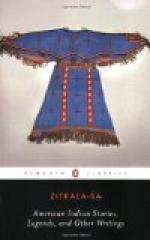When, at length, I raised my head to hear more clearly the moaning of the wind in the corner logs, I noticed the daylight streaming into the dingy room through several places where the logs fitted unevenly. Turning to my mother, I urged her to tell me more about Dawee’s trouble, but she only said: “Well, my daughter, this village has been these many winters a refuge for white robbers. The Indian cannot complain to the Great Father in Washington without suffering outrage for it here. Dawee tried to secure justice for our tribe in a small matter, and today you see the folly of it.”
Again, though she stopped to hear what I might say, I was silent.
“My child, there is only one source of justice, and I have been praying steadfastly to the Great Spirit to avenge our wrongs,” she said, seeing I did not move my lips.
My shattered energy was unable to hold longer any faith, and I cried out desperately: “Mother, don’t pray again! The Great Spirit does not care if we live or die! Let us not look for good or justice: then we shall not be disappointed!”
“Sh! my child, do not talk so madly. There is Taku Iyotan Wasaka,[1] to which I pray,” she answered, as she stroked my head again as she used to do when I was a smaller child.
[Footnote 1: An absolute Power.]
III.
My mother’s curse upon white settlers.
One black night mother and I sat alone in the dim starlight, in front of our wigwam. We were facing the river, as we talked about the shrinking limits of the village. She told me about the poverty-stricken white settlers, who lived in caves dug in the long ravines of the high hills across the river.
A whole tribe of broad-footed white beggars had rushed hither to make claims on those wild lands. Even as she was telling this I spied a small glimmering light in the bluffs.
“That is a white man’s lodge where you see the burning fire,” she said. Then, a short distance from it, only a little lower than the first, was another light. As I became accustomed to the night, I saw more and more twinkling lights, here and there, scattered all along the wide black margin of the river.
Still looking toward the distant firelight, my mother continued: “My daughter, beware of the paleface. It was the cruel paleface who caused the death of your sister and your uncle, my brave brother. It is this same paleface who offers in one palm the holy papers, and with the other gives a holy baptism of firewater. He is the hypocrite who reads with one eye, ‘Thou shalt not kill,’ and with the other gloats upon the sufferings of the Indian race.” Then suddenly discovering a new fire in the bluffs, she exclaimed, “Well, well, my daughter, there is the light of another white rascal!”
She sprang to her feet, and, standing firm beside her wigwam, she sent a curse upon those who sat around the hated white man’s light. Raising her right arm forcibly into line with her eye, she threw her whole might into her doubled fist as she shot it vehemently at the strangers. Long she held her outstretched fingers toward the settler’s lodge, as if an invisible power passed from them to the evil at which she aimed.




